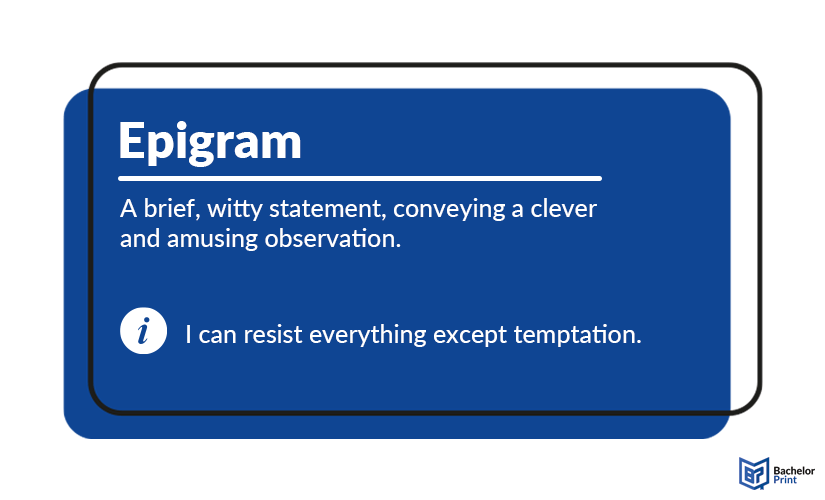
Ever heard of the saying “It is better to have loved and lost than never to have loved at all”? This sentence is a famous example of a poetic epigram that expresses an observation as a profound truth. Although they are often associated with wit and brevity, they hold valuable lessons for academic writing on how to convey ideas efficiently. In this article, we’ll give a thorough explanation of this device, as well as examples.
Definition: Epigram
It is a rhetorical device that conveys a sharp observation or witty remark in the form of a brief, insightful statement. Originating from the Greek word “epigramma,” meaning “inscription,” Greek epigrams were concise poems, historically inscribed on tombstones of fallen friends. These pithy expressions typically involve a twist or surprising conclusion that leave a lasting impression on the reader, thus having been cherished for centuries by poets all over the world. While they are regularly humorous, their main purpose is to encapsulate profound truths or insights in just a few words, which is why they are often used in poetry, political speech, and literature.
In the Bible, Christian epigrams typically appear as brief, wise statements, much like proverbs. A famous example of a first-century epigrammatist is the Roman poet Martial, whose epigrams often combined humor and critique of Roman society.

Epigram: Examples
Witty epigrams can come in different forms; from short and stand-alone couplet poems (a two-line rhymed verse) to stanzas (a group of verses) within longer poems, and even in the sonnet form. Famous examples from different fields can be found below, along with their origins.
Epigram: Purpose
The primary purpose is to convey a profound truth, observation, or insight in a concise and often witty manner. They are designed to:
- Provoke thought
- Evoke humor
- Express criticism
- Leave an impression
Their compact nature forced the writer to strip away unnecessary details, which leaves only the most essential and often clever core of the idea. This smart way of expressing complex ideas in simple words is the reason many academics and American poets adore this stylistic device.
Printing Your Thesis With BachelorPrint
- High-quality bindings with customizable embossing
- 3D live preview to check your work before ordering
- Free express delivery
Configure your binding now!
Epigram vs. epigraph
The origin of epigram and epigraph both share similarities as they both have Greek roots and originated as inscriptions.
While both can appear as short sentences, their difference lies in their purpose and usage. An epigraph is strictly used as a quotation from another work that is then placed at the beginning of a piece of writing. Essentially, they are used as preludes and give us readers insight into the central themes before they delve into the main text. Whereas a pithy epigram is used to convey truth or observation memorably, often by using humor, irony, or satire. An epigraph can be an epigram, but an original epigram can never be an epigraph.
FAQs
An example is Oscar Wilde’s famous quote:
“I can resist everything except temptation.”
This stylistic device is widely used in literature and speech to convey complex ideas memorably, often as a short, insightful or satirical poem, a tradition dating back to first-century epigrams.
An epigraph is a quotation at the beginning of a literary work to suggest a theme, whereas the latter is a brief and clever statement that conveys an observation.
In the Bible, this stylistic device can be found in the form of short, wise sayings, similar to proverbs.
“Pride goes before destruction, and a haughty spirit before a fall.”
— Proverbs 16:18
